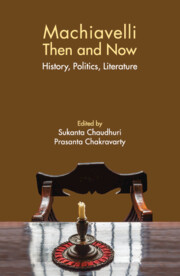13 - Machiavelli Reading
Published online by Cambridge University Press: 21 January 2022
Summary
Reading, Presence, and Representation
The act of reading almost always involves a vanishing trick. It is an escape from our self-evident identity, or, to put it in a tautological gloss, from what we identify as evidence of our so-called self. Writing on the problem of the self in connection with literature, especially as it appears in the existentialist psychology of Ludwig Binswanger, Paul de Man distinguishes between four possibilities that make it difficult to find a ground on which ‘selves’ may meet the unity of the literary consciousness. Of these, two are ‘the self that reads’ and the ‘the self that reads itself ‘. Straying from the arguments of Binswanger examined by de Man, one could say that in the first, the reader felt that she was other than she at the time of reading, and that in the second, the author's self shifted with contingent interpretations of her work. Whichever way we look at the distinctions—and de Man has four, not two—they seem designed to scramble the reader's fragile ontological co-ordinates at the moment of reading. The ‘I’ who reads is not always the ‘I’ accessible to us as a sturdily cognizable object, although we are conscious of the undeniable subjective experience we go through as readers.
Readers of Wolfgang Iser may recall his adaptation of Ernst Cassirer's idea of the concept as a model of symbol usage involved in reading fiction— fiction being that species of speech that lacks a situational reference. Cassirer thought of the concept as a way of moving its object to an ideal distance so that it might be understood (one might also say, ‘so that it may be read’)—a process in which presence needs to make way for representation. Cassirer's phenomenology of knowledge was not the only idea Iser drew on. Roman Ingarden was not an idealist like Cassirer, but his phenomenological realism served Iser well. Iser agrees with Ingarden that one who reads a text is the source of ‘concretization’. The reader, instead of merely contemplating a finished object, generates significance by fleshing out the indeterminacies of the text. The reader of fiction translates the world into something it is not: into symbols that are independent of the visible, making it possible for the reader, in principle at least, to see an invisible world.
- Type
- Chapter
- Information
- Machiavelli Then and NowHistory, Politics, Literature, pp. 235 - 261Publisher: Cambridge University PressPrint publication year: 2022



